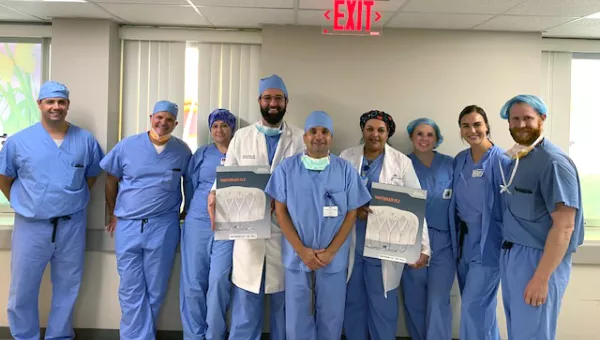Welcome to a new chapter in AFib care. The left atrial appendage closure, or WATCHMAN implant, is a one-time procedure that may lower your stroke risk without daily blood thinners.
WATCHMAN Procedure at Cape Fear Valley Health
The WATCHMAN device is a small implant that doctors place inside the heart. It’s used to prevent strokes in people with a condition called atrial fibrillation, or AFib.
In AFib, the heart doesn't beat the way it should, which can allow blood clots to form. These clots can cause strokes if they travel to the brain.
The WATCHMAN goes into a part of the heart where these clots often start (the left atrial appendage). It's like a tiny plug that closes off this area, so blood clots can't get through.
The procedure to put in the WATCHMAN is minimally invasive. It's done through a small tube that doctors insert into a vein in the leg. Afterward, many people can gradually stop taking the blood-thinning medicines that are typically used to prevent strokes in AFib patients.
What is Atrial Fibrillation?
Atrial fibrillation occurs when your heart beats in an irregular, often rapid rhythm, which can cause blood to pool and clot. If a clot breaks loose, it can lead to a stroke.
Treating AFib is important to help prevent these dangerous clots and to keep your heart working as it should. Treatment can also relieve symptoms such as fatigue and shortness of breath. Keeping a steady heartbeat can improve your quality of life and reduce your risk of serious heart-related issues.
Typical treatments for AFib include:
- Medications to control heart rate and rhythm
- Blood thinners to prevent clots
- Procedures such as cardiac ablation or pacemaker placement to maintain a normal heartbeat
In some cases, doctors may recommend surgery or an implant like the WATCHMAN to reduce stroke risk.
Am I a Candidate for WATCHMAN?
Your doctor will carefully assess your individual risks and benefits before considering the WATCHMAN implant. Good candidates for a WATCHMAN implant are typically patients who:
- Have an increased risk for stroke and are recommended for oral anticoagulation (OAC)
- Are suitable for short-term OAC*
- Have an appropriate reason to seek a non-pharmacologic alternative to OACs


